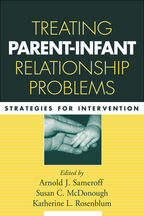Treating Parent-Infant Relationship Problems
Strategies for Intervention
Edited by Arnold J. Sameroff, Susan C. McDonough, and Katherine L. Rosenblum
HardcoverPaperback
Hardcover
orderDecember 3, 2003
ISBN 9781572309579
Price: $62.00 304 Pages
Size: 6" x 9"
Paperback
orderJuly 12, 2005
ISBN 9781593852450
Price: $41.00 304 Pages
Size: 6" x 9"
Sign up for emails on upcoming titles on Families & Couples (with special discounts)!
“This is an important and thought-provoking book that carries the field of infant mental health to a new level of synthesis and discovery. The research and practice described in this volume will help students, practitioners, and researchers recognize the challenges inherent in relationship-based activities, integrate the various strands that form the theoretical framework of infant-parent mental health practice, and explore novel methodologies and approaches that will enhance the lives of caregivers and their infants.”

—Samuel J. Meisels, EdD, President, Erikson Institute
“This volume provides state-of-the-science knowledge for working with parents and infants. Experienced professionals as well as novices will find the book uniquely useful, whether they define their work as early intervention, infant mental health, or developmental care. The authors are all experts in dealing with relationship issues, and bring their evolving theoretical and clinical thinking to the chapters. Sameroff et al. have produced an ideal text for infancy-related graduate courses in psychology, social work, nursing, psychiatry, education, and occupational and physical therapy.”

—Kathryn E. Barnard RN, PhD, Center on Infant Mental Health and Development, University of Washington School of Nursing
“This is a landmark volume that forcefully reminds the field that relationships are the key to successful therapy and intervention. Both the early pioneers and the more recent innovators of this approach are well represented in this exciting and forward-looking collection. The inclusion of contributions from diverse fields makes this volume useful for a wide range of practitioners and scholars, including social workers, occupational therapists, pediatricians, psychiatrists, and psychologists. It should be required reading for developmentally and clinically oriented graduate students.”

—Ross D. Parke, PhD, Center for Family Studies, University of California, Riverside; past president, Society for Research in Child Development
“This long-overdue book meets a compelling need. The gap between what we know about early relationship problems and what we do to help parents and their young children is unacceptably wide. This book offers a wealth of knowledge that can help us narrow that gap. The editors have done a masterful job in bringing together a virtual ‘who's who’ in early childhood mental health, and in making their combined wisdom accessible to advanced students and practitioners.”

—Jack P. Shonkoff, MD, Heller School for Social Policy and Management, Brandeis University
“This is the first integration of therapeutic approaches to problematic parent-infant relationships, and I am sure it will be the best for many years to come. The book is a definitive guide to techniques of prevention and intervention, and it is exemplary in its combination of readability and clinical sophistication. An absolute gem of a collection, this book is essential reading not only for those psychotherapists working with parents and infants, but also for the many others whose technique is influenced by contemporary understandings of early relationships.”

—Peter Fonagy, PhD, Psychoanalysis Unit, University College London, UK
—Samuel J. Meisels, EdD, President, Erikson Institute
“This volume provides state-of-the-science knowledge for working with parents and infants. Experienced professionals as well as novices will find the book uniquely useful, whether they define their work as early intervention, infant mental health, or developmental care. The authors are all experts in dealing with relationship issues, and bring their evolving theoretical and clinical thinking to the chapters. Sameroff et al. have produced an ideal text for infancy-related graduate courses in psychology, social work, nursing, psychiatry, education, and occupational and physical therapy.”
—Kathryn E. Barnard RN, PhD, Center on Infant Mental Health and Development, University of Washington School of Nursing
“This is a landmark volume that forcefully reminds the field that relationships are the key to successful therapy and intervention. Both the early pioneers and the more recent innovators of this approach are well represented in this exciting and forward-looking collection. The inclusion of contributions from diverse fields makes this volume useful for a wide range of practitioners and scholars, including social workers, occupational therapists, pediatricians, psychiatrists, and psychologists. It should be required reading for developmentally and clinically oriented graduate students.”
—Ross D. Parke, PhD, Center for Family Studies, University of California, Riverside; past president, Society for Research in Child Development
“This long-overdue book meets a compelling need. The gap between what we know about early relationship problems and what we do to help parents and their young children is unacceptably wide. This book offers a wealth of knowledge that can help us narrow that gap. The editors have done a masterful job in bringing together a virtual ‘who's who’ in early childhood mental health, and in making their combined wisdom accessible to advanced students and practitioners.”
—Jack P. Shonkoff, MD, Heller School for Social Policy and Management, Brandeis University
“This is the first integration of therapeutic approaches to problematic parent-infant relationships, and I am sure it will be the best for many years to come. The book is a definitive guide to techniques of prevention and intervention, and it is exemplary in its combination of readability and clinical sophistication. An absolute gem of a collection, this book is essential reading not only for those psychotherapists working with parents and infants, but also for the many others whose technique is influenced by contemporary understandings of early relationships.”
—Peter Fonagy, PhD, Psychoanalysis Unit, University College London, UK



